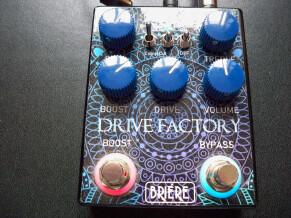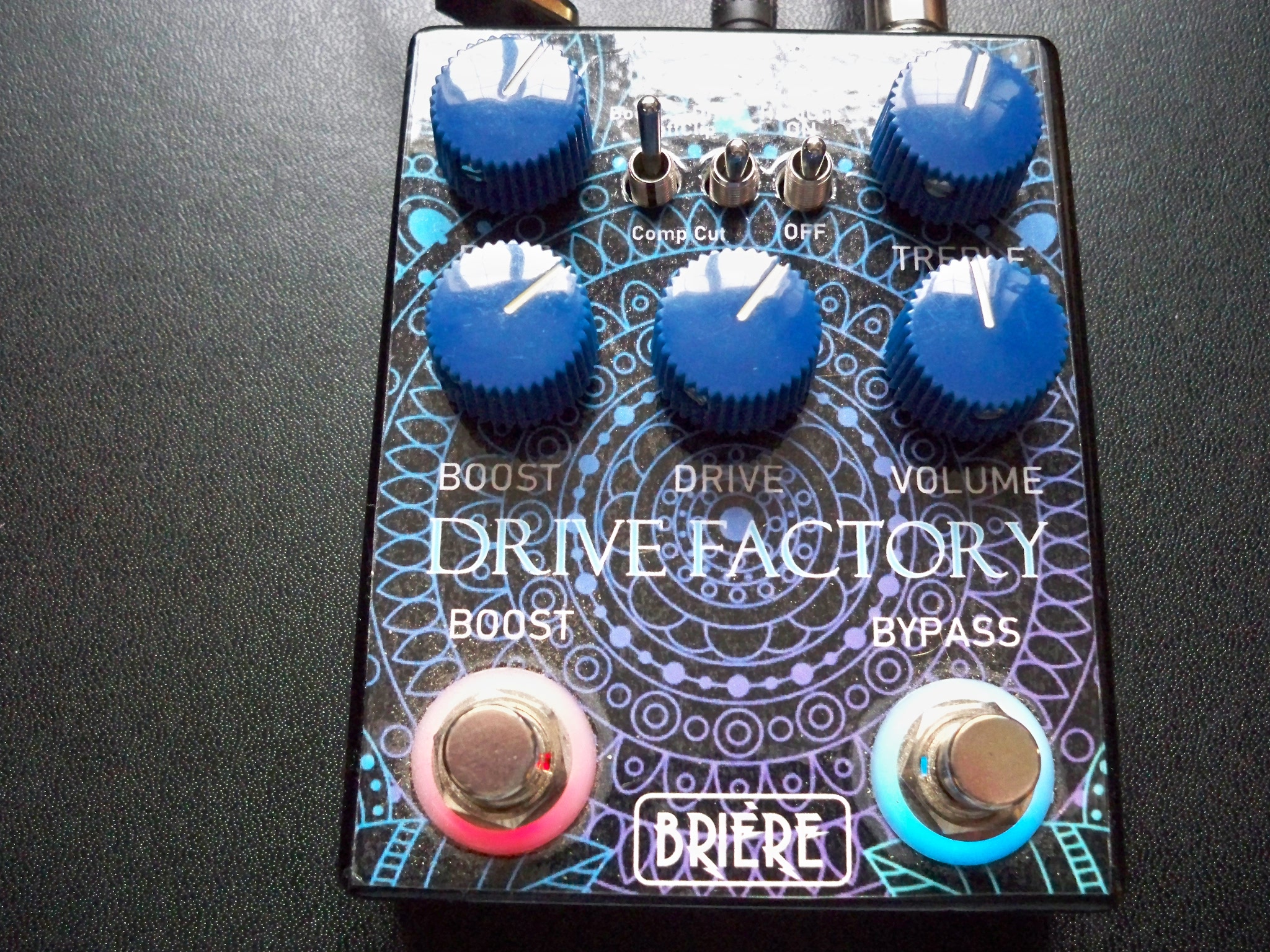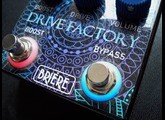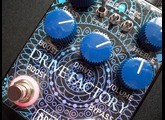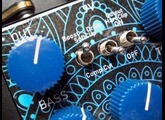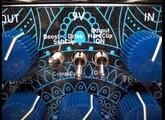« Great Sound and Plenty of Options, from Clean Boost to Heavy Distortion »
Published on 11/09/20 at 14:52
Value For Money :
Excellent
Audience:
Anyone
Christian Briére hit a homerun with the Drive Factory, and in a number of ways. First, the most important aspect of a drive is its sound, and the Drive Factory sounds darn good. It has a medium grain that sings classic rock, to my ears, although it doesn’t take much dialing in for a thicker and harder result. Second, although some musicians may require a single flavor of drive only, whether low, moderate or hi-gain, it’s good to have a variety of tone possibilities, and the Drive Factory offers enough variation that you wouldn’t think it was the same pedal. And so, let’s go over what the Drive Factory has to offer.
There are two sides to the pedal – an on/off switch on the right and a Boost switch on the left – both of which are quiet during operation, e.g., no pops or clicks. The general overdriven sound and boost both are governed by the Drive and Volume controls. Both the main Drive and Boost increase volume and, therefore, need to be coordinated with the Volume control. The main Drive starts off with very little hair when turned all the way down, thus making the Drive Factory ideal for clean boosting (crank up the Treble knob and it becomes a great sounding treble boost). Once approaching the 10-o’clock mark, the Drive Factory produces a fantastic sounding crunch that really cuts through the mix with its pronounced note definition and harmonics. Once reaching 12-o’clock and beyond, the quality of the drive becomes more distorted and even slightly fuzz-like (particularly if you back off on the treble and increase the bass). The Boost function starts off rather clean when not too high (e.g., 9-o’clock or less), but does add some hair or sizzle once past that point. I’m uncertain of the dB increase of the Boost, but it must be at least 12dB minimum.
Now, there are some toggle switches that adds even more tonal variations, starting with the Output Hard-clip switch that increases distortion and compression to the main Drive (when flipped on). This adds a modern flare to the overdriven quality of the drive, thus providing a greater sonic span when dialing in that ideal Rock to Hard Rock sound. Likewise, the Boost also has an extra Drive switch if looking for more grain in your soloing, but also a switch to add or cut compression. Combine both of these for very smooth and sustained lead.
Overall, the Drive Factory needs far more attention than currently experiencing (its subdued reputation has much to do with it being a flagship pedal by a small Canadian boutique builder). It sounds fantastic, with both clean and hi-gain amps, and it makes everything sound better. That can be said about other drives, but the fact that you can dial into so many impressive tones, which vary significantly the more you tweak, places the Drive Factory into its own category from the usual drive pedals flooding the market. It is very touch sensitive, so that you hear varying levels of drive and note detail based on playing aggression, but it also cleans up nicely with a guitar’s volume. And regardless of the settings, the crispness of the drive makes it stand out in the mix as good as one would want and expect. Its build is solid, with noiseless switches and smooth turning pots, and I like the Steampunk design of the graphics, combining both vintage and modern appeal. At $180 Canadian, it not only is a fantastic buy, but a steal for US customers, or other countries, with a superior exchange rate.
There are two sides to the pedal – an on/off switch on the right and a Boost switch on the left – both of which are quiet during operation, e.g., no pops or clicks. The general overdriven sound and boost both are governed by the Drive and Volume controls. Both the main Drive and Boost increase volume and, therefore, need to be coordinated with the Volume control. The main Drive starts off with very little hair when turned all the way down, thus making the Drive Factory ideal for clean boosting (crank up the Treble knob and it becomes a great sounding treble boost). Once approaching the 10-o’clock mark, the Drive Factory produces a fantastic sounding crunch that really cuts through the mix with its pronounced note definition and harmonics. Once reaching 12-o’clock and beyond, the quality of the drive becomes more distorted and even slightly fuzz-like (particularly if you back off on the treble and increase the bass). The Boost function starts off rather clean when not too high (e.g., 9-o’clock or less), but does add some hair or sizzle once past that point. I’m uncertain of the dB increase of the Boost, but it must be at least 12dB minimum.
Now, there are some toggle switches that adds even more tonal variations, starting with the Output Hard-clip switch that increases distortion and compression to the main Drive (when flipped on). This adds a modern flare to the overdriven quality of the drive, thus providing a greater sonic span when dialing in that ideal Rock to Hard Rock sound. Likewise, the Boost also has an extra Drive switch if looking for more grain in your soloing, but also a switch to add or cut compression. Combine both of these for very smooth and sustained lead.
Overall, the Drive Factory needs far more attention than currently experiencing (its subdued reputation has much to do with it being a flagship pedal by a small Canadian boutique builder). It sounds fantastic, with both clean and hi-gain amps, and it makes everything sound better. That can be said about other drives, but the fact that you can dial into so many impressive tones, which vary significantly the more you tweak, places the Drive Factory into its own category from the usual drive pedals flooding the market. It is very touch sensitive, so that you hear varying levels of drive and note detail based on playing aggression, but it also cleans up nicely with a guitar’s volume. And regardless of the settings, the crispness of the drive makes it stand out in the mix as good as one would want and expect. Its build is solid, with noiseless switches and smooth turning pots, and I like the Steampunk design of the graphics, combining both vintage and modern appeal. At $180 Canadian, it not only is a fantastic buy, but a steal for US customers, or other countries, with a superior exchange rate.


